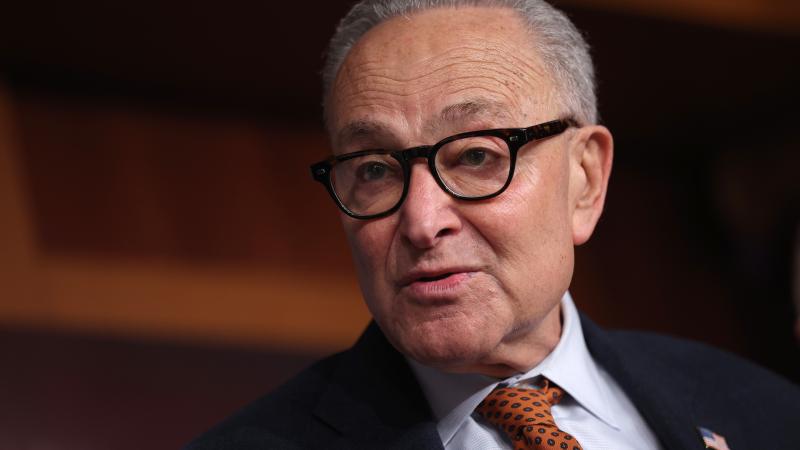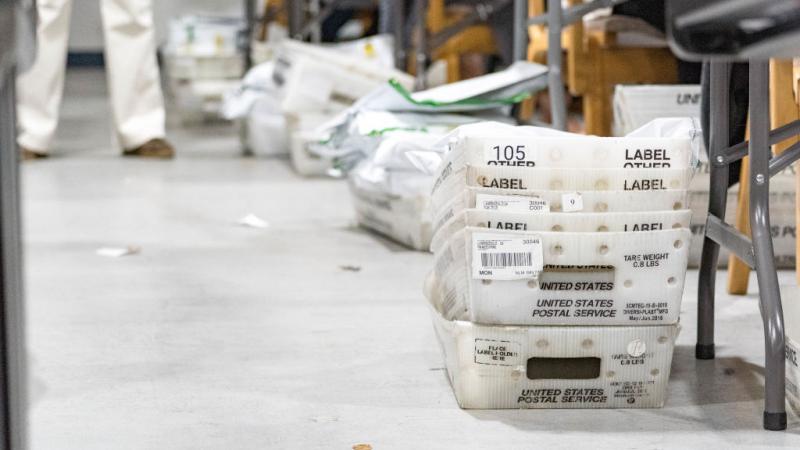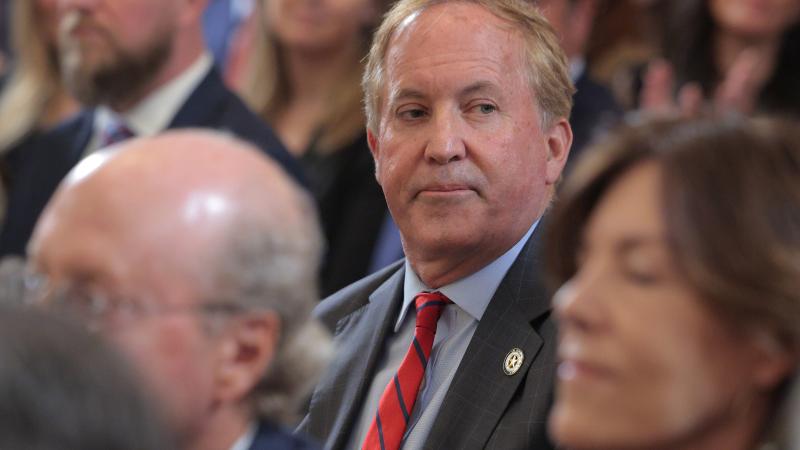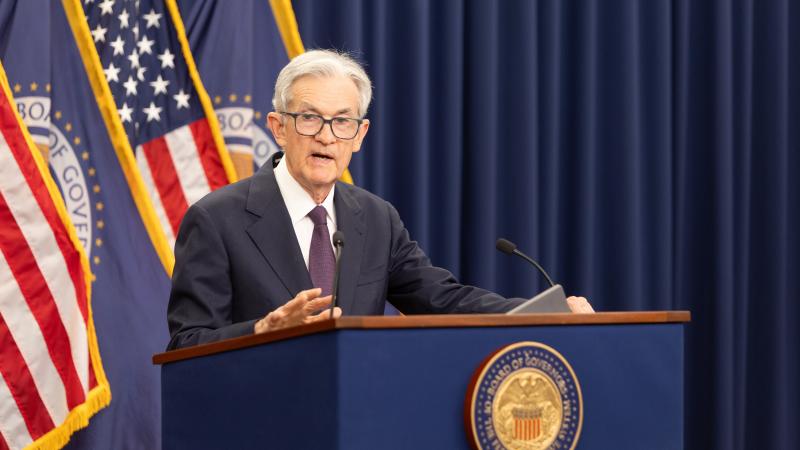Jim Jordan probes politics of Pfizer COVID vax trial as research suggests jabs hurt fertility
Drugmaker's "three most senior" R&D officials "deliberately slow[ed] testing" so it would end after 2020 election, ex-official allegedly said. Spike protein persistence study author says took four years to get published after submission.
The political pressures around clinical trials for COVID-19 vaccines in the 2020 presidential campaign first drew scrutiny from Democrats, with then-nominees Joe Biden and Kamala Harris spreading mistrust of Operation Warp Speed and suggesting they would avoid jabs developed in the Trump administration.
The parties largely switched sides in the Biden administration, with then-Vice President Harris claiming it was "starting from scratch" on a vaccine strategy and even mandating vaccinations for her own campaign employees once she replaced Biden at the top of the 2024 ticket.
Yet Republicans have continued claiming Operation Warp Speed saved millions of lives based on modeling studies, amid five years of global research on severe adverse events in certain groups following COVID vaccination, from heart inflammation to neurological disorders, and the jabs' mediocre-to-negative performance against infection.
House Judiciary Committee GOP leaders seized on new evidence Thursday that Pfizer withheld what it considered positive trial results until after the 2020 election, with the result that President Trump couldn't take credit for a finished vaccine, giving Republicans something to unite around amid internal divisions over the pace of reversing Biden's COVID vaccine policies.
The Department of Health and Human Services is reportedly planning to stop recommending routine COVID vaccines for pregnant women, teens and children, more than 100 days into the Trump administration and after new peer-reviewed research suggests COVID vaccines worsen fertility and mRNA jabs specifically can produce spike protein for up to eight months.
Yet another peer-reviewed study this year, published in the Endocrine Society's Journal of Clinical Endocrinology and Metabolism, found the risk of underactive thyroid "significantly increased from 6 to 12 months" after vaccination, and that both under- and overactive thyroid was "significantly elevated at 12 months" for mRNA vaccine recipients specifically.
The Taiwanese researchers "used a huge database, carefully matched vaccinated and unvaccinated patients, and followed outcomes for a full year," former New York Times drug industry reporter Alex Berenson wrote. "That combination gave the study very strong statistical power, meaning that its findings are probably not the result of chance."
"25,000 children a day are getting the latest version of the mRNA shot," Texas doctor Mary Talley Bowden, an early victim of COVID treatment policing whose litigation prompted the FDA to stop demonizing ivermectin on social media, wrote on X Friday.
"Four years after their rollout, I continue to see patients severely harmed by these shots," she wrote, responding to a critic that she'll give HHS Secretary Robert F. Kennedy Jr. credit when "these products are pulled off the market."
Robert Malone, mRNA vaccine pioneer-turned-critic, pushed back on criticism of Surgeon General nominee Casey Means based on her failure to explicitly call for mRNA COVID vaccines to be withdrawn "due to strong (un)safety signals and inverted risk/benefit profiles in virtually all age cohorts," while laying out his separate concerns about Means.
Critics won't acknowledge the "political reality" that doctors who "prominently" questioned mRNA COVID vaccines "are unlikely to be confirmed by this Senate at this time," Malone said, worrying the turmoil will "fracture the 'Big Tent' coalition formed by the merger of MAHA and MAGA movements … particularly in light of the upcoming midterm elections."
The House Judiciary probe builds on Wall Street Journal reporting that federal prosecutors are investigating drugmaker GSK's claim that its former senior scientist Phil Dormitzer, who led its rival Pfizer’s vaccine R&D during Operation Warp Speed, told GSK colleagues in "late 2024" that Pfizer hid "the success of its Covid vaccine" until after the 2020 election.
If true, it would validate President Trump's post-2020 election claim that Pfizer "didn't have the courage" to announce a vaccine before the election. Pfizer announced an early analysis two days after the election that its vaccine was 90% effective, though it had yet to collect required safety data and has been accused of hiding deaths in the trial.
'Decision to deliberately slow down clinical testing'
Judiciary Chairman Jim Jordan, R-Ohio, sent letters to Dormitzer and Pfizer CEO Albert Bourla, dated May 15 but only released Thursday, that disclose in part what GSK told the committee when it followed up on the Journal reporting.
Dormitzer went to GSK human resources "shortly after" the 2024 election, "visibly upset," to request a relocation to Canada "due to concerns that he could be investigated by the incoming Trump Administration over his role in developing Pfizer’s COVID-19 vaccine," GSK wrote. He told the rep something like "the timing of the vaccine" was not "a coincidence."
Pfizer's rival also claimed that Dormitzer had told GSK employees that Pfizer's "three most senior people" in R&D "were involved in a decision to deliberately slow down clinical testing so that it would not be complete prior to the results of the presidential election that year," and that Dormitizer was "clear" it was not "delaying disclosure of completed results."
Jordan sought all documents and communications between and among Dormitzer and Pfizer employees relating to COVID vaccine testing reporting data starting from March 1, 2020, the same timeframe related to executive branch agencies, and March 1, 2020 to Nov. 30, 2021 for documents and communications to and from Dormitzer.
From Dormitzer alone, Jordan asked for all documents and communications to and from him on the subject from Nov. 16, 2022 onward.
The scientist has denied making the comments GSK attributed to him.
'Potential gigantic demographic time bomb'
The study of mRNA and traditional COVID vaccines and their effect on "ovarian reserves" in the journal Vaccines, published by Swiss open-access publisher MDPI, found that each "significantly" reduced the number of "primordial, primary, and secondary follicles" relative to the control group, and more so in the mRNA group compared to the traditional group.
This "accelerated follicular loss and alterations in apoptotic pathways during folliculogenesis" may harm egg supplies in rats — the study population — and hence "further investigations into the vaccines’ effects on human ovarian reserve are needed."
Published March 24, the Turkish study apparently flew under the radar until vaccine-skeptical McCullough Foundation epidemiologist Nicolas Hulscher analyzed it under the headline "COVID-19 mRNA Shots Destroy Over 60% of Women’s Non-Renewable Egg Supply," at which point it was picked up by Kennedy-founded Children's Health Defense.
Edward Dowd, a financier known for studying excess deaths data following the one-size-fits-all COVID vaccination campaign but dismissed by social media-approved fact-checkers, said the study complements an earlier review of lost pregnancies and birth defects from Pfizer clinical trial data the feds withheld for 16 months, until July 2022.
"If this is true in humans we have a potential gigantic demographic time bomb globally," he wrote on X.
The spike protein persistence study in the Taylor & Francis journal Human Vaccines & Immunotherapeutics, whose corresponding author said took four years to get published on May 13, finds shorter persistence in the COVID-negative jabbed – up to 245 days — than a study awaiting peer review by Yale immunobiologists, who found 600-700 days.
"We knew back in 2021 that some were experiencing long-term sequelae [consequences] from the COVID vaccines and tried to sound the alarm," Massachusetts' Lawrence General Hospital anesthesiologist Ram Yogendra wrote. "Instead we got silenced, defamed, abused and sent death threats."
As peer review was ongoing, Yogendra said in February it was "validating to find the Yale group citing us and corroborating what we found in 2021-2022." He shared redacted correspondence with journals to illustrate "the overall struggle when you are on the 'outside' trying to get something that the medical community considers 'uncomfortable' peer-reviewed."
The Facts Inside Our Reporter's Notebook
Videos
Links
- Joe Biden and Kamala Harris spreading mistrust
- Vice President Harris dubiously claiming it was "starting from scratch"
- mandating jabs for her own campaign employees
- claiming Operation Warp Speed saved millions
- heart inflammation
- neurological disorders,
- jabs' mediocre-to-negative performance
- House Judiciary Committee GOP leaders seized on
- reportedly planning to stop recommending
- COVID vaccines worsen fertility
- produce spike protein for up to eight months
- Journal of Clinical Endocrinology and Metabolism
- Alex Berenson wrote
- early victim of COVID treatment policing
- prompted the FDA to stop demonizing ivermectin
- I continue to see patients severely harmed
- when "these products are pulled off the market."
- pushed back on criticism of Surgeon General nominee Casey Means
- Wall Street Journal
- Pfizer announced an early analysis two days after
- has been accused of hiding deaths in the trial
- letters to Dormitzer
- Pfizer CEO Albert Bourla
- Vaccines
- Nicolas Hulscher analyzed it under the headline
- Children's Health Defense
- financier known for studying excess deaths data
- dismissed by
- social media-approved
- fact-checkers
- earlier review of lost pregnancies and birth defects
- we have a potential gigantic demographic time bomb
- spike protein persistence study
- corresponding author said took four years
- study awaiting peer review by Yale immunobiologists
- Yogendra said in February












